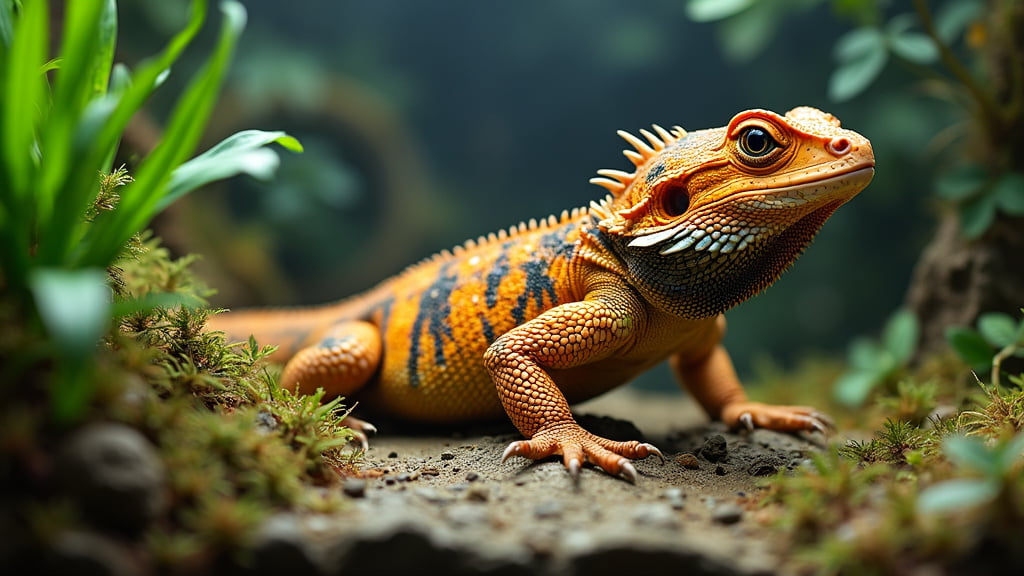Bringing a bearded dragon into your home is a thrilling experience, but ensuring you have the right tank setup is crucial to their health and happiness. In this blog post, we’ll dive into the key elements of a bearded dragon tank setup. We’ll share tips from my years of personal experience with these fascinating reptiles and provide practical advice you can use today.
The Right Tank Size and Type
Tank Size
The first step in creating the perfect environment for your bearded dragon is to choose the right tank size. A juvenile bearded dragon can thrive in a smaller tank, but as they grow, they will need more space. Typically:
- Hatchlings (0-4 months): 20-gallon tank
- Juveniles (4-12 months): 40-gallon tank
- Adults (12+ months): 75-gallon tank or larger
Tank Type
For bearded dragons, a glass tank with a secure mesh lid is ideal. Glass allows for easy temperature control and visibility, while the mesh lid ensures proper ventilation. Avoid tanks made of plastic or wood, as they can retain odours and be difficult to clean.
Personal tip: Invest in a front-opening tank for ease of access and reduced stress for your dragon during feeding and cleaning.
Substrates: Choices and Considerations
Types of Substrates
Choosing the right substrate is vital for creating a safe and comfortable habitat:
- Paper Towels/Newspaper: Excellent for hatchlings due to their simplicity and ease of cleaning.
- Ceramic Tiles: A low-maintenance option that also helps to wear down your dragon’s nails.
- Reptile Carpet: Reusable and visually appealing, but requires regular cleaning.
- Playsand: Suitable for adults, but only if it is closely monitored to avoid any risk of impaction.
Substrate Tips
Avoid Loose Substrates for Young Dragons: Materials like sand or wood chips pose an ingestion hazard that can lead to serious health issues.
Spot Clean Daily: Keep your bearded dragon’s home clean by removing waste and uneaten food.
Lighting and Heating: Creating the Ideal Environment
UVB Lighting
Bearded dragons require UVB lighting to synthesise Vitamin D3, which is essential for calcium absorption and bone health. A full-spectrum UVB bulb should be placed within 30 cm (12 inches) of the dragon. Replace these bulbs every six months even if they are still emitting visible light, as their UVB output diminishes over time.
Heating
Proper heating mimics the bearded dragon’s natural desert environment:
- Basking Spot: Aim for temperatures around 40-43°C (104-110°F) in one area of the tank.
- Cool Side: Maintain a cooler area of about 24-29°C (75-85°F) to allow your dragon to regulate their body temperature.
Pro tip: Use a ceramic heat emitter or an under-tank heater to maintain consistent nighttime temperatures, ideally between 18-21°C (65-70°F).
Decor and Enrichment: Making the Tank a Home
Hides and Climbing Structures
Bearded dragons love to explore and hide. Include:
- Hiding Spots: At least one on the warm side and one on the cool side.
- Branches and Rocks: Safe, smooth items to climb and bask on.
Feeding and Water Dishes
Use shallow dishes for food and water to prevent accidental drowning. Change the water daily to ensure it is always fresh.
Plants and Accessories
Fake plants add visual interest and mimic the dragon’s natural habitat without the risks associated with live plants. Items like hammocks can also provide enrichment.
Personal note: I once added a digging box filled with organic soil to my dragon’s tank. He loved it! It’s an excellent way to satisfy their natural digging instincts.
Conclusion
Setting up the perfect tank for your bearded dragon involves careful consideration of their unique needs. From the right tank size and safe substrates to proper lighting and heating, each element plays a crucial role in their wellbeing. Remember, regular cleaning and maintenance are key to creating a thriving environment for your reptilian friend.
If you’re unsure about any aspect of your bearded dragon’s care, always consult a veterinarian specialising in exotic pets. Your dragon’s health and happiness are worth the extra effort to ensure their home is just right.
Further Reading
By following these guidelines, you can create a comfortable, enriching habitat that will keep your bearded dragon healthy and happy for years to come. Happy herping!
Note: This blog post was written with British English spelling and vocabulary in mind. Optimised for SEO and crafted from years of personal experience with exotic pets.

